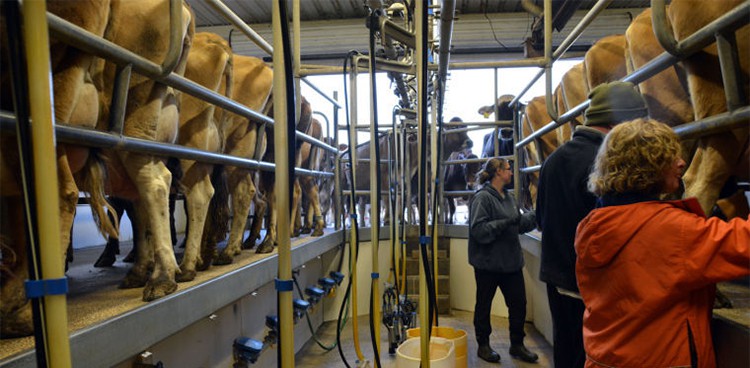
What could lawmakers have to fight about concerning cheese? As it turns out, quite a bit. Here are two bills that have been introduced in the Connecticut House and Maryland Senate that concern cheese shops and the production of raw milk cheese.
Connecticut
State Rep. Terrie Wood first introduced HB 5349 to the Connecticut State House in 2013, but its niche focus caused it be overlooked in favor of bigger issues. Now the bill is back up for a second hearing and a vote. HB 5349 would create a wine and beer permit for cheese shops, which would allow them to sell limited amounts of wine and beer. Rep. Wood introduced the bill on behalf of Ken Skovron, owner of Darien Cheese and Fine Foods. Both she and Skovron have spoken out multiple times in favor of the bill.
Two years ago, liquor stores in Connecticut started selling cheese. So it would only make sense to allow cheese shops to sell beer and wine, right? Peter Trolio, who owns the wine shop Nicholas Roberts, argued the bill would only be fair if it allowed liquor stores to expand their food selection. Trolio wants to sell all the foods cheese shops can sell, like olives, bread, and charcuterie.
Skovron argued in the General Law hearing for HB 5349 that cheese shops were being held back from sales opportunities:
At the moment I feel that the independent cheese shop has been placed at a competitive disadvantage. By allowing the limited sales of wine and beer in our shops we will have the equal opportunity to grow, expand, and compete with stores that are already doing so.
Skovron also noted that Vermont, New Hampshire, and Massachusetts all have laws in place that allow cheese shops to sell limited amounts of wine and beer and the sky hasn’t fallen.
Maryland
State Sen. Addie Eckhart proposed SB 0122 to the Maryland Senate Finance Committee on Thursday, which would change definitions for certain regulations on milk products.
In 2007, Chapter 437 established a Farmstead Cheese Pilot Program. This program allowed five dairy farmers in the state to produce and sell raw-milk cheese for the next five years. In 2012, the program was extended another two years. SB 0122 would remove the five-year limit and the designation of pilot program. It would also allow more than five dairy farms to produce cheese, expand the definition to include “other hooved mammal[s]” aside from cows and goats, and remove the limit on the number of animals that can be in a herd. Originally, dairies had to limit their herds to 120 animals or fewer over concerns about the spread of disease.
While farmstead cheese is a term typically applied to any cheese made on a farm that produces its own dairy, the analysis of the bill offers the definition currently in use:
“Farmstead cheese” is defined as cheese that meets definitions and standards for hard cheese established in federal regulations and is made on a farm using only the raw milk produced by the herd on the farm.
So, while the bill specifically concerns farmstead cheese, it is really only looking at raw milk farmstead cheese. By changing the definitions in the bill to allow more than five dairies to produce (the bill’s definition of) farmstead cheese, more dairy farmers in Maryland will have the opportunity to diversify what they make and sell.
Maryland prohibits the sale of raw milk unless it’s used for making farmstead cheese. Nearby Pennsylvania sells raw milk over the border, which means those laws might be under scrutiny in Maryland soon. Read these offerings from culture to learn more about raw milk and why it’s caused such a stir and current US law concerning raw milk to gain context about this particular battle.
Feature Photo Credit: Melanie Balakit for Capital News Service



